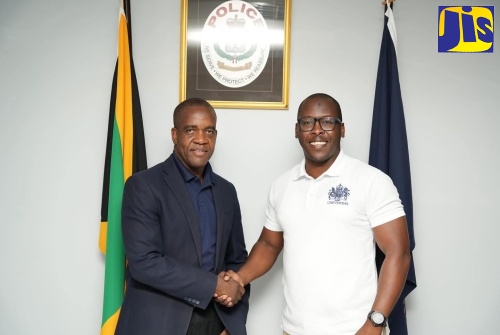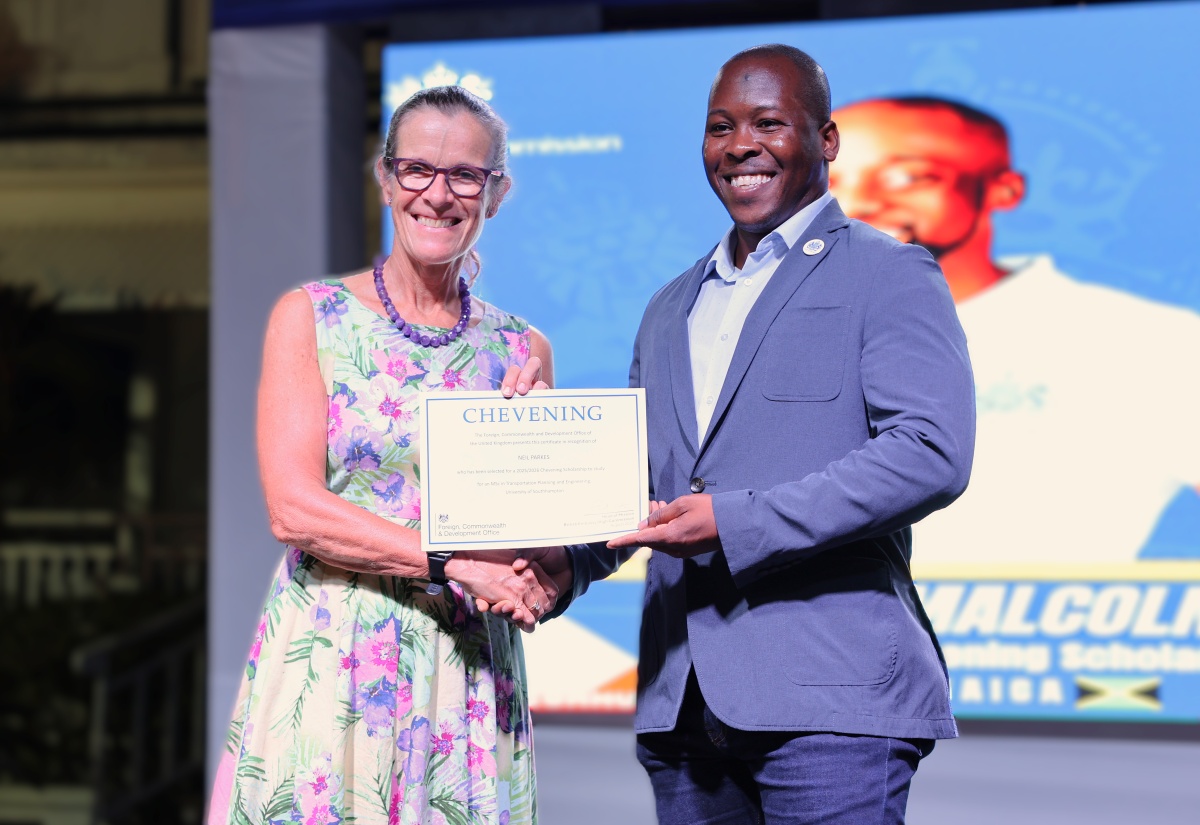Chevening Scholar, Sergeant Neil Parkes, Sets Sights on Smarter, Safer Roads for Jamaica
By: , October 11, 2025The Full Story

Police Sergeant Neil Parkes, driven by personal experience and an unwavering commitment to public service, has been awarded the prestigious Chevening Scholarship for 2025, a transformative milestone in his pursuit to modernise Jamaica’s transportation infrastructure.
He will be pursuing a Master of Science in Transportation Planning and Engineering at the University of Southampton in England.
Sergeant Parkes’ early life was shaped by the challenges of commuting daily from Yallahs in St. Thomas to Kingston, where he attended school from early-childhood through to university..
Up to third form at Jamaica College, Sergeant Parkes journeyed daily from Yallahs to Kingston alongside his mother, who operated a fruit business in the capital – a demanding commute that shaped his first-hand understanding of Jamaica’s transportation challenges.
“So, living in St. Thomas, there were a lot of transportation problems that we had experienced. Whether it was the road conditions or the [infrequency] of buses, or how the buses were packed [with passengers] because there were [only] two coasters at the time; [so they] were largely uncomfortable,” he recalls.
Sergeant Parkes’ understanding of the transportation challenges deepened in 2018 when he joined the Jamaica Constabulary Force (JCF) and was stationed at Matilda’s Corner Police Station in St. Andrew.
Determined to be part of the solution, he enrolled at the University of Technology (UTech) Jamaica in 2020 to pursue a Bachelor of Science in Urban and Regional Planning, further equipping himself to address the island’s transportation challenges through informed, strategic reform.
“So initially, when I was in my [undergrad programme] in Urban and Regional Planning, I knew that transportation was what I really wanted to do. I was thrilled by the whole prospect that having this skill could actually aid in the development of Jamaica,” Sergeant Parkes tells JIS News.
He was later recognised for his university research project, which assessed the Jamaica Urban Transit Company’s (JUTC’s)accessibility provisions for persons with disabilities within the Papine university district.
“So, I wanted to do something in St. Thomas, really. But because it was a research project that encompassed two other members, what I had to do was to look at something that was very pressing in Kingston as a community project,” Sergeant Parkes explains.
“We decided to do research to see how the Jamaica Urban Transit Company could improve its services to cater to people with disabilities, by extending its fleet to acquiring buses that are low entry, for example,” he adds.
Sergeant Parkes further reveals that the project examined how strategic sidewalk redesigns could enhance commuter safety and equity for persons with disabilities, reducing their exposure to vehicular traffic.
The police officer was honoured with two awards: one from the Urban Development Corporation (UDC) for being the most all-rounded student in his programme, and another from the Jamaica Bauxite Institute (JBI) in recognition of his distinction within the third-year cohort.
He discloses that although the awards were conferred primarily for leadership and community engagement, his research project also played a contributory role in his scholarship selection.
Now a Chevening Scholar, the Police Sergeant has extended his award-winning journey to the University of Southampton.
Sergeant Parkes describes his selection as a “phenomenal” achievement, reflecting both personal pride and professional aspiration.
“It’s a phenomenal feeling… that I am [now] able to unlock a lifelong dream of becoming a transport professional,” he says.
“[Being a Chevening Scholar now] allows me to get a first-class education, develop a global network… [and] develop my leadership potential, to come back to Jamaica to take on various challenges that may arise, or at least give me the potential to have them resolved. So, to be chosen out of a large pool of persons, it’s out of this world to describe what it feels like,” he adds.
Sergeant Parkes indicates that during the one-year programme, he intends to undertake a comprehensive analysis of Jamaica’s road networks and transport systems, with the aim of reducing road fatalities and enhancing traffic management.

He also intends to explore strategies for enhancing the resilience of local roadways to natural disasters, including the use of composite materials as a cost-effective alternative to traditional repairs typically required after adverse weather events.
The Chevening Scholar further proposes that the integration of an intelligent transport system could enhance traffic management and positively influence motorists’ behaviours.
“Through a legislative approach, we can modernise how we actually interact with motorists, in terms of dealing with traffic violations and infractions in a more 21st century way,” Sergeant Parkes reasons.
On the transportation front, he believes that the JUTC’s efficiency could be enhanced through the incorporation of tracking technology, enabling passengers to access real-time arrival information, adjusted for variables such as traffic congestion.
He further emphasises the merit of reinstating dedicated bus lanes as a means of facilitating smoother transit during peak hours and improving overall traffic efficiency.
“This is also another infrastructure issue, where we need to have dedicated bus lanes. So, if you take the public transportation, it can’t be that you take a bus going to Spanish Town, for example, in the evening and you suffer [in] traffic from Spanish Town Road into Spanish Town. So, this is something I want to do as well,” Sergeant Parkes states.
The police officer also identified additional areas for improvement, including the integration of smart technology into traffic signals to anticipate travel demand and adjust timing, thereby promoting more equitable traffic flow.
The scholar also highlights the potential of incorporating railways and ferries as alternative modes of transportation to alleviate traffic congestion, particularly within urban centres.
“So, in essence, my vision one day, is to be a part of the table to contribute to a multi-modal transit system,” he tells JIS News.
Recognising the critical role of law enforcement in the success of his proposed initiatives, Sergeant Parkes emphasises the need for further training of police personnel, which could be facilitated through targeted seminars and workshops.
“There are many things that we could benefit from to improve the JCF’s approach to traffic control [and] traffic management. So, through workshops and seminars, I intend to use the knowledge and skills from [my postgraduate programme] to improve the other officers’ skills. So, whenever they step out into the road to do any sort of traffic management, they are equipped with the right information to help each unique situation,” he says.
For Police Sergeant Neil Parkes, being selected as a Chevening Scholar is a profound honour, one he intends to fully embrace and translate into meaningful contributions to the Jamaica Constabulary Force and the wider Jamaican society.




